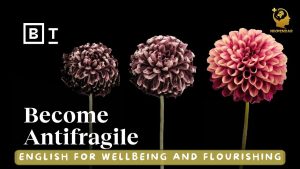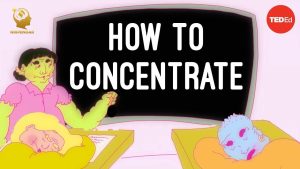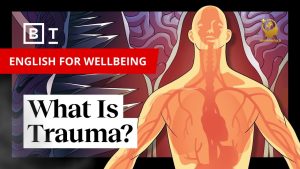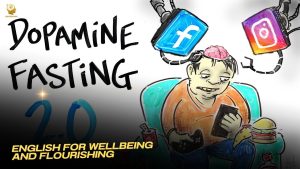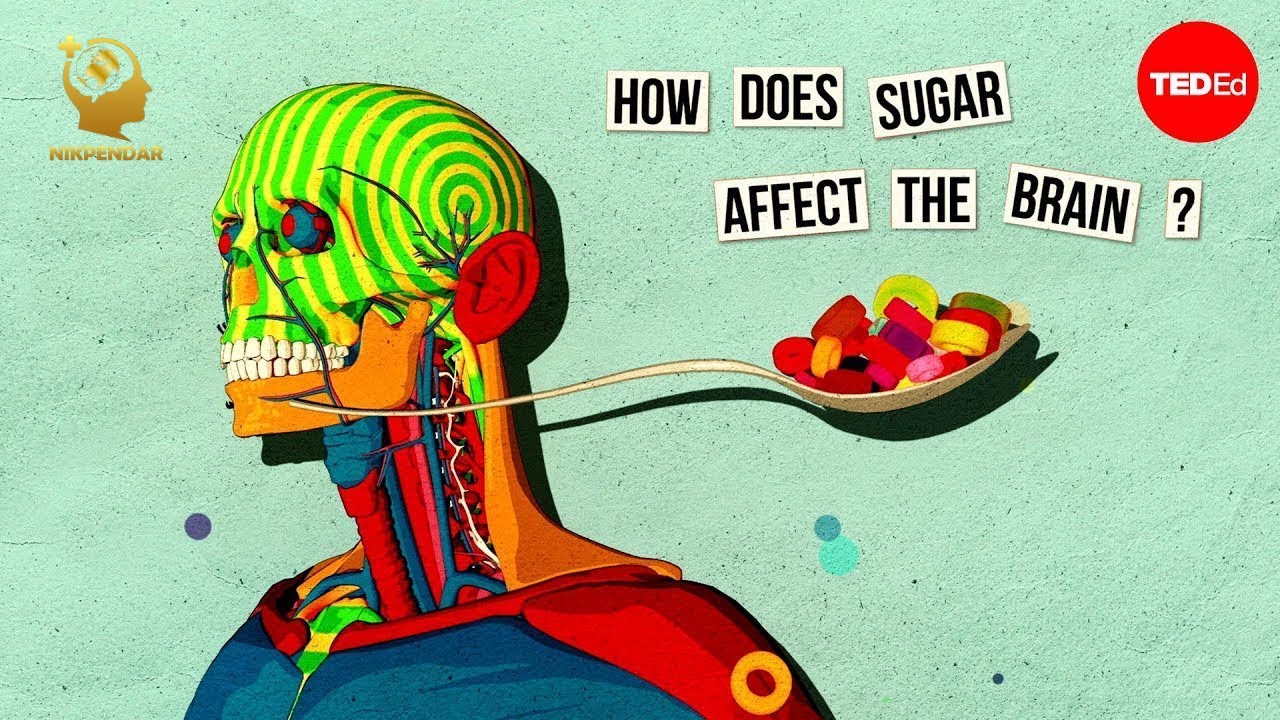
Beginner
Task 1: Your Favorite Sweet Foods
- Prompt: The speaker describes many sweet foods like cookies, candies, and ice cream. What are your favorite sweet foods or desserts?
- Instructions: Name 2-3 of your favorite sweet foods. Explain why you like them, describing their taste or how they make you feel.
- Example Phrases: “My favorite sweet food is…”, “I like it because it’s…”, “It tastes…”
Task 2: Hidden Sugar
- Prompt: The video mentions that sugar isn’t just in desserts; it’s also added to many other foods. Can you name some foods that have hidden sugar, based on the video?
- Instructions: Identify at least three surprising foods mentioned in the transcript that contain added sugar.
- Example Phrases: “Sugar is in…”, “Also, you can find sugar in…”
Intermediate
Task 1: How Sugar Activates Your Brain’s Reward System
- Prompt: The transcript explains how sugar affects your brain’s reward system. Describe what happens in your brain when you taste something sweet, focusing on the journey from your tongue to the reward system.
- Instructions: Explain the steps involved: from taste buds to the brain, and how this system makes you feel good. What is the main chemical involved in this reward?
- Key Concepts to mention: sweet-taste receptors, signal, brain’s reward system, dopamine, “should I do that again?”
Task 2: Why We Crave Variety in Food
- Prompt: The video discusses why our brains evolved to pay special attention to new or different tastes. Explain the two main reasons for this.
- Instructions: Describe why variety in our diet is important from an evolutionary perspective. How does this relate to dopamine levels “leveling off” when we eat the same food repeatedly?
- Key Concepts to mention: brain evolved, new/different tastes, detect food gone bad, get all nutrients, dopamine levels off, variety.
Advanced
Task 1: Sugar’s Addictive Effects: A Neurochemical Perspective
- Prompt: The speaker states that “overconsumption of sugar can have addictive effects on the brain” because “sugar behaves a little bit like a drug.” Analyze the neurochemical similarities and differences between the brain’s response to excessive sugar and to addictive drugs (like alcohol, nicotine, or heroin), specifically focusing on dopamine’s role.
- Instructions: Compare how dopamine is released and sustained by sugar versus other substances. Discuss the concept of “overactivating” the reward system and its consequences (loss of control, craving, tolerance).
- Key Concepts to include: dopamine, reward system, overactivation, addictive effects, loss of control, craving, increased tolerance, violent vs. non-violent dopamine release, leveling off.
Task 2: Evolutionary Biology Meets Modern Diet: The Sugar Paradox
- Prompt: The transcript explains how our brain’s evolutionary design encourages variety in our diet for survival. However, in today’s food environment, this same mechanism can lead to overconsumption of sugary foods. Discuss this paradox by explaining how the brain’s natural reward system (designed for survival) can be exploited by modern sugar-rich diets.
- Instructions: Explain the evolutionary advantage of seeking new foods. Then, analyze how highly palatable, sugar-rich foods can continuously trigger the reward system, bypassing the natural “leveling off” mechanism for healthy foods. What are the broader implications of this for public health?
- Key Concepts to include: evolutionary advantage, variety, modern food environment, dopamine response, continuous reward, “hooked on sugary foods,” public health implications.
Beginner
Instructions: Listen to the audio. Answer the questions with short answers.
Task 1: Basic Facts about Sugar
- What are two examples of sweet foods mentioned at the beginning?
- Is sugar only in candies and desserts? Yes or No?
- Name one food that is NOT a dessert but has added sugar, according to the video.
- What chemical is called the “major currency of our reward system”?
Task 2: Sugar and Your Feelings
- When you eat something sweet, does it activate your brain’s “reward system”? Yes or No?
- What kind of feeling do you get when your reward system is activated by food?
- Does broccoli cause dopamine to be released? Yes or No?
Intermediate
Instructions: Listen to the audio. Answer the questions in complete sentences.
Task 1: The Brain’s Response to Sugar
- Describe the path of the signal from the sweet-taste receptors on your tongue to the brain’s reward system.
- What is the “reward system” and what subconscious question does it help to answer?
- Besides food, name two other things that activate the brain’s reward system, as mentioned in the transcript.
Task 2: Dopamine, Variety, and Addiction
- How does the speaker explain why it’s hard to get kids to eat vegetables like broccoli?
- When you eat the same healthy food many days in a row, what happens to your dopamine levels, and why does the brain do this (give both reasons)?
- According to the speaker, how does eating too much sugar change the dopamine response, making sugar behave “a little bit like a drug”?
Advanced
Instructions: Listen to the audio carefully. Answer the questions with detailed explanations, drawing on specific information from the transcript.
Task 1: The Mechanics of Sugar Consumption and Brain Overdrive
- Explain the full “domino effect” that sugar consumption kickstarts in the brain, from taste buds to the gut, detailing the different types of receptors and signals involved.
- Discuss the “series of unfortunate events” that occur when the reward system is overactivated by sugar. How do these events relate to the concept of addiction?
- Compare and contrast the dopamine release triggered by sugar versus drugs like alcohol, nicotine, or heroin, as described by the speaker. What is the key difference, and what implication does this have for understanding sugar’s impact?
Task 2: Evolutionary Biology and Modern Dietary Challenges
- Elaborate on the two evolutionary reasons why the brain pays special attention to new or different tastes in food. How did this mechanism benefit our ancestors?
- Explain the “paradox” presented by the brain’s evolved response to food variety when confronted with the modern availability of sugar-rich foods. Why does the dopamine response to sugar “not level out” when consumed in large quantities, unlike healthy foods?
- Based on the entire transcript, synthesize the speaker’s main message about sugar consumption. What is the overall conclusion regarding the “addictive effects” of sugar, and what balanced advice is given at the end?
Beginner
Reading Tasks Based on “The Science of Sugar and Your Brain” Transcript
Here are reading tasks for three proficiency levels, based on the provided transcript.
Task 1: Find the Sugar
Read the first few paragraphs of the transcript. Questions:
- Name three sweet foods mentioned at the beginning.
- Name three foods that are not desserts but often have added sugar.
- What is sugar called in science (a type of molecule)?
Task 2: Sugar and Your Brain
Read the part about what happens when sugar hits your tongue. Questions:
- What part of your tongue senses sweet tastes?
- Where does the signal go from your tongue first?
- What does the brain’s “reward system” help your brain decide?
Intermediate
Task 1: The Reward System Explained
Read the sections describing the brain’s reward system and dopamine. Questions:
- In your own words, explain what the brain’s “reward system” is and what its main job is.
- What is dopamine, and why is it important for the reward system?
- Besides food, name two other things mentioned in the text that can activate the reward system.
Task 2: Why We Like New Foods
Read the part about eating the same balanced meal every day. Questions:
- What happens to dopamine levels when you eat the same healthy food many days in a row?
- What are the two main reasons our brain evolved to pay special attention to new or different tastes?
- According to the text, why do dopamine levels “level off” when a food becomes boring?
Advanced
Task 1: The “Addictive Effects” of Sugar
Read the entire transcript, focusing on the comparison between sugar and drugs. Questions:
- According to the speaker, what are the “series of unfortunate events” that occur when the brain’s reward system is overactivated by sugar?
- Compare and contrast the dopamine release caused by sugar versus drugs like alcohol, nicotine, or heroin, as described in the text.
- How does the brain’s response to overconsumption of sugar differ from its response to a healthy, balanced meal in terms of dopamine leveling out? What is the significance of this difference?
Task 2: Evolution, Dopamine, and Modern Dietary Challenges
Read the entire transcript, paying close attention to how evolutionary biology and neurochemistry interact with modern food consumption. Questions:
- Explain how the brain’s evolutionary imperative to seek dietary variety, driven by dopamine responses to novelty, contributes to the challenge of resisting highly palatable, sugar-rich foods in modern society.
- Discuss the “domino effect in the brain” caused by sugar consumption. How does the speaker summarize the key takeaway regarding moderate versus overconsumption of sugar?
- Considering the scientific information presented, what are the broader implications for understanding human cravings and dietary habits in an environment where sugar is “everywhere”?
Beginner
Task 1: What is Sugar?
The speaker talks about different kinds of sugar. What is sugar? Where can you find it, not just in candies? Name at least three examples.
- Word Count: 30-50 words
- Keywords to use: sugar, carbohydrates, food, drink, examples (e.g., tomato sauce, yogurt, honey)
Task 2: Your Brain’s “Reward System”
When you eat something sweet, your brain has a reward system. What kind of feeling does this system give you? Why does your brain do this?
- Word Count: 40-60 words
Keywords to use: reward system, feeling, sweet, brain, do that again
Intermediate
Task 1: The Dopamine Response to Food
The transcript explains how dopamine is released when we eat. Describe how dopamine levels change when you eat a healthy, balanced meal many days in a row. Then, explain what happens to dopamine levels when you eat sugar-rich food often. How do these differences explain why sugary foods can be hard to resist?
- Word Count: 100-150 words
- Concepts to include: dopamine, balanced meal, sugar-rich food, leveling out, rewarding, hard to resist.
Task 2: Why Variety is Important
Our brains evolved to pay special attention to new or different tastes. What are the two main reasons mentioned for this? How does this natural preference for variety connect to why some foods might become “boring” and why we might crave new ones?
- Word Count: 120-180 words
- Concepts to include: variety, new tastes, brain evolved, detect food that’s gone bad, nutrients, dopamine, boring food.
Advanced
Task 1: Sugar as a “Drug-like” Substance
The speaker suggests that “overconsumption of sugar can have addictive effects on the brain” and that “sugar behaves a little bit like a drug.” Analyze the scientific evidence presented in the transcript that supports this claim, focusing on the dopamine response and the concept of the reward system. Compare and contrast the effects of sugar on the brain’s reward pathways with those of more traditional addictive drugs (e.g., alcohol, nicotine, heroin), noting both similarities and differences.
- Word Count: 200-250 words
- Key Concepts to address: dopamine, reward system, overactivation, addictive effects, drug-like behavior, loss of control, craving, increased tolerance, comparison with other drugs.

